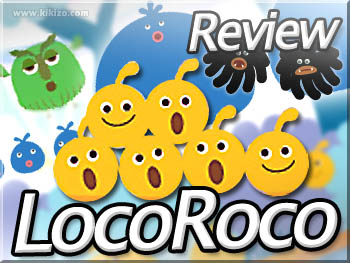LocoRoco
It's bright, it's happy. And it's possibly the best thing on the PSP.
| Version PSP | Developer SCEI | Publisher SCE | Genre Puzzle adventure |
||||
Let's be honest. There's not been much to enjoy on the PSP lately, especially if you're not the kind of person who enjoys the testosterone-injected angry games that the PSP is currently overrun with. I've been waiting a long time for someone to step forward and make the sort of games the system deserves. It looks like Sony is the one to do it.

Everything about LocoRoco is made to get the game into as many people's hands as possible, and Sony would like a lot of those hands to be fresh (hence the game being one of the first to get its own bundle). The game design screams fun, and the concept couldn't be more simple. All you need to do is grow your LocoRocos by feeding them fruit while guiding them through wandering levels. You can break them apart into individual LocoRocos and then pull them back together. Sometimes you'll need to fight (or avoid) evil, floating monsters too. It's all a lot of fun.
LocoRoco has been on my mind since I first saw it at Sony's booth last year at the Tokyo Game Show. Nearly a year ago, the core gameplay was already in place, and I wondered if it needed something more to keep the game interesting. I had nothing to worry about. The gameplay is just as simple as it was when I saw it a year ago - hit trigger buttons to tilt, both to jump, one button to break apart your LocoRocos or bring them back together - but it's the better for it. There's no need to complicate the game and doing that would probably dilute the fun that's here.
But why should the controls be mapped to the triggers? The control scheme could just as easily have been reworked into something more similar to regular platformers, but the current approach seems tailored to making this game as accessible as possible, to get those non-gamers or casual players more comfortable with their intuited way of handling a controller. The controls are also consistent with the overall design of the game. You're not actually moving the LocoRocos at all; you're moving the entire world to guide them. Once you realize this, things start to make a bit more sense.
What makes the game work are the level design and the amount of freedom you have in squeezing worth out of them. Much like an old Mario game, you could storm through levels and get to the end as quickly as possible, but that only gives you half the experience. There are all sorts of items to collect, some of them with an influence on the larger experience. As you find some of the hidden items and characters, you'll earn pieces to equip a playhouse where LocoRocos loop in Lemmings-like fashion. Other items simply boost your completion stats and bolster your sense of accomplishment.
The biggest draw to LocoRoco is the pervasive sense of fun. The pastel-coloured world and the gibberish-spouting characters are infectiously cute. This may be a problem for some, but it should help expand the repertoire of the PSP. It's also surprisingly easy to form an emotional attachment to your LocoRocos, and I found myself hurling abuse at the evil Mojas when they killed one of my LocoRocos - my babies, I called them.
Some people will slam the difficulty level. It's not a hard game to play, but it does successfully tread that fine line between making the core of the game easy and accessible to the mainstream while still adding enough stuff to collect for the hardcore gamers. You will not, however, be seeing the Game Over screen often - if at all.
Frankly, there's not much I don't like about the game. I've never had as much pure fun with my PSP as I have with LocoRoco. And that's a good thing. Sony is going to need a lot more games like this if it wants to hold off the juggernaut that is the DS.
| ||||||||||||
|

























 Satoru Iwata Video Interview - the late Nintendo president spoke with Kikizo in 2004 as 'Nintendo Revolution' loomed.
Satoru Iwata Video Interview - the late Nintendo president spoke with Kikizo in 2004 as 'Nintendo Revolution' loomed. Kaz Hirai Video Interview - the first of Kikizo's interviews with the man who went on to become global head of Sony.
Kaz Hirai Video Interview - the first of Kikizo's interviews with the man who went on to become global head of Sony. Ed Fries Video Interview - one of Xbox's founders discusses an epic journey from Excel to Xbox.
Ed Fries Video Interview - one of Xbox's founders discusses an epic journey from Excel to Xbox. Yu Suzuki, the Kikizo Interview - we spend time with one of gaming's most revered creators.
Yu Suzuki, the Kikizo Interview - we spend time with one of gaming's most revered creators. Tetris - The Making of an Icon: Alexey Pajitnov and Henk Rogers reveal the fascinating story behind Tetris
Tetris - The Making of an Icon: Alexey Pajitnov and Henk Rogers reveal the fascinating story behind Tetris Rare founders, Chris and Tim Stamper - their only interview? Genuinely 'rare' sit down with founders of the legendary studio.
Rare founders, Chris and Tim Stamper - their only interview? Genuinely 'rare' sit down with founders of the legendary studio. The History of First-Person Shooters - a retrospective, from Maze War to Modern Warfare
The History of First-Person Shooters - a retrospective, from Maze War to Modern Warfare